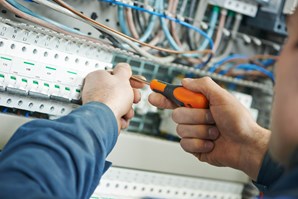The role of technology in modernising an age-old trade
Find your course today
Our plumbing and gas infrastructure within the home are vital in ensuring our homes run smoothly and safely. While these trades have deep historical roots, the integration of technology has propelled them into the modern age, revolutionising everything from installation to maintenance. We delve into the significant role that technology plays in transforming plumbing and gas work, ensuring efficiency, safety, and sustainability.

Smart leak detection systems
Water leaks can wreak havoc on a home, causing damage to structures and leading to mould growth. However, advanced leak detection systems powered by technology have become invaluable tools for plumbers. These systems utilise sensors and smart algorithms to detect even the smallest of leaks, enabling early intervention before they escalate into costly disasters. Homeowners can also benefit from smart leak detection devices that provide real-time alerts to their smartphones, offering peace of mind even when they're away.
Remote monitoring and control
With the rise of the Internet of Things (IoT), plumbing and gas systems can now be remotely monitored and controlled. Smart thermostats for example, allow homeowners to adjust their water heaters from their smartphones, optimising energy usage and ensuring hot water is readily available when needed. Similarly, IoT-enabled gas detectors provide real-time monitoring of gas levels, alerting homeowners and professionals to any potential leaks or safety hazards, thereby enhancing overall safety.
Advanced pipe inspection technologies
Traditionally, identifying issues within pipes required invasive methods such as excavation or dismantling walls. However, modern plumbing incorporates advanced technologies like video pipe inspection systems. These systems utilise small, high-definition cameras attached to flexible rods, allowing plumbers to inspect pipes remotely and accurately identify blockages, leaks, or other issues without causing unnecessary damage to property. This not only saves time and money but also minimises disruption for homeowners.
Water and energy conservation
In an era increasingly focused on sustainability, technology plays a crucial role in promoting water and energy conservation within plumbing systems. High-efficiency fixtures, such as low-flow toilets and faucets, leverage innovative design and engineering to minimise water usage without sacrificing performance. Additionally, smart irrigation systems utilise weather data and soil moisture sensors to optimise watering schedules, reducing water waste in landscaping. These advancements not only benefit the environment but also contribute to significant cost savings for homeowners over time.
The integration of technology into plumbing and gas work has brought about transformative changes, enhancing efficiency, safety, and sustainability across the board. From smart leak detection systems to smart heating controls, these advancements empower professionals to deliver higher-quality services while minimising disruptions and costs for homeowners. As technology continues to evolve, the future of plumbing and gas work promises even greater innovation, further solidifying its crucial role in modern home infrastructure.
Thinking of training to become a gas engineer or plumber? View our courses here.






